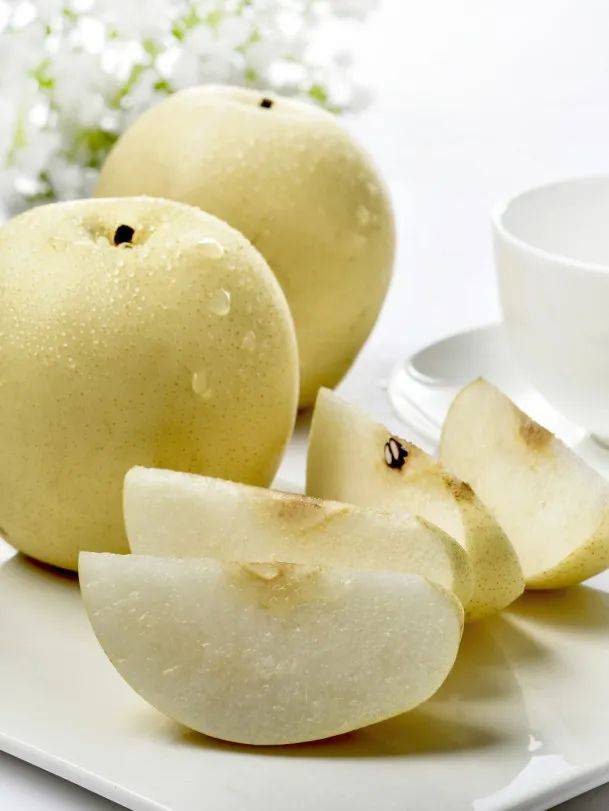Chushu, as the fourteenth solar term of the twenty-four solar terms, marks the gradual decline of the hot summer air and the increasing presence of autumn.
As the ancients said: “Chu, means to depart; the hot air comes to an end here.” At this time, the weather begins to transition from hot to cool, daylight shortens, and nights lengthen, making it a crucial period for body nurturing. Today, let’s discuss how to take care of our bodies during Chushu to help everyone maintain health in early autumn.
Three foods to eat more of to nurture the body as autumn approaches:
1. Eat more foods that moisten the lungs and generate bodily fluids
With the arrival of autumn, the humidity in the air gradually decreases, leading the human body to easily experience symptoms of “autumn dryness” such as dry mouth, dry skin, etc. During this time, it’s advised to consume more foods that moisten the lungs and generate fluids, such as pears, white fungus, and lilies.
Pears are sweet and cool in nature, with effects that clear heat, moisten the lungs, and quench thirst, making them an excellent choice for health in autumn; white fungus is rich in plant gum, which nourishes yin and moistens the lungs; lilies benefit the heart and calm the mind, as well as moisten the lungs and relieve cough, making them suitable for autumn consumption.
2. Eat more foods that strengthen the spleen and stomach
After Chushu, the temperature gradually turns cool, and the digestive functions of the body may weaken; hence, attention should be paid to strengthening the spleen and nourishing the stomach. During this period, foods like yam, pumpkin, and lotus root can be consumed more often. Yam is neutral and sweet, effective in tonifying the spleen and stomach and aiding digestion; pumpkins are rich in vitamins and minerals, which help in nourishing the stomach and strengthening the spleen; lotus root is good for strengthening the spleen, opening appetite, nourishing qi, and enriching blood, making it an excellent option for regulating spleen and stomach in autumn.
3. Eat more foods that clear heat and detoxify
Although the summer heat has receded, daytime temperatures may still be high, and the body might retain some “excess heat”; hence, it’s suitable to consume more foods that clear heat and detoxify such as mung beans, bitter melon, and cucumbers. Mung bean soup can clear heat and detoxify, cooling down the body; bitter melon has effects that clear heat, dispel fire, and detoxify the eyes; cucumbers can generate fluids, quench thirst, and aid in detoxification, making them appropriate for consumption during Chushu.
Four things to avoid to steer clear of health risks:
■ Do not seek excessive coolness
After Chushu, although the days are still hot, the morning and evening temperatures start to drop, making the body more susceptible to cold. Especially during times with significant temperature differences between morning and evening, it is easy to catch colds or develop joint pains. Therefore, during Chushu, avoid seeking excessive coolness, do not overuse air conditioning or fans, and wear appropriate clothes when sleeping at night to prevent cold from entering the body.
■ Do not binge eat
Autumn is the season for harvest, with various fresh ingredients available, which can easily increase appetites. However, overeating, especially high-fat and high-sugar foods, can burden the spleen and stomach, affecting digestive health.
During Chushu, diet should be controlled, maintaining a fullness of about seven or eight parts, particularly avoiding overly greasy or spicy foods to prevent gastrointestinal discomfort.
■ Do not stay up late
After Chushu, the days grow shorter and nights longer, making it an ideal time to adjust one’s schedule. Traditional Chinese medicine suggests that autumn is suitable for going to bed early and waking up early, aligning with natural changes, which is helpful for nurturing lung qi and protecting the body’s yang energy. Staying up late can lead to reduced immunity and potentially worsen skin problems caused by autumn dryness.
Therefore, during Chushu, one should avoid staying up late and ensure sufficient sleep to enhance the body’s self-repair ability.
■ Do not engage in intense exercise
After Chushu, temperatures gradually decrease, and the body’s yang energy begins to gather. During this time, excessive vigorous exercise may consume too much yang energy, which is harmful to health.
Hence, during Chushu, one should avoid high-intensity workouts and opt for gentler forms of exercise such as walking, Tai Chi, or yoga, which can exercise the body while preventing the depletion of yang energy.
Adapt to the solar term and guard your health!
The essence of health maintenance during Chushu is to align with nature and act accordingly with the season. The family of traditional medicine kindly reminds you that as temperatures change, the physiological state of the human body also quietly shifts; only by properly nurturing oneself during this period can a solid foundation for health in autumn and winter be established.
Let us pay attention to every change in our bodies during Chushu, nurture with care, and welcome a healthy and comfortable early autumn.


